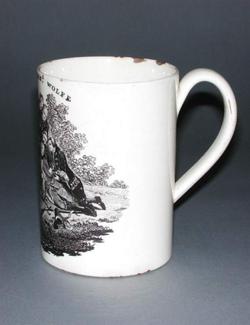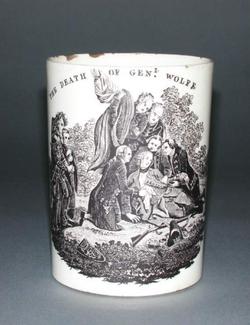Awaiting location update
Maker(s)
Factory:
Unidentified Staffordshire Pottery
(Possibly)
Factory:
Unidentified Liverpool pottery
(Possibly)
Entities
Categories
Description
Creamware, lead-glazed and decorated with overglaze transfer printing.
Pale cream-coloured earthenware lead-glazed and transfer-printed in black, using the glue bat method. The wheel-thrown mug is a cylindrical shape with a loop handle. Opposite the handle is printed an image with the title ‘THE DEATH OF GENL WOLFE’. The collapsed General is shown surrounded by his supporters with his musket and battle gear in front on him; two more onlookers are placed off to the left. The scene takes place in a landscape with trees in the background.
Notes
History note: Provence unknown before Lord Swaythling collection; sold at Christie’s on 8 May 1924, 'The Swaythling Heirlooms sold by order of the Trustees of the Rt Hon. Montagu, First Lord Swaythling deceased, being part of the Swaythling heirlooms', lot 53, where it was bought by Dr J.W.L. Glaisher, FRS, Trinity College, Cambridge
Legal notes
Dr J.W.L. Glaisher Bequest
Measurements and weight
Height: 11.7 cm
Width: 12 cm
Acquisition and important dates
Method of acquisition: Bequeathed
(1928-12-07)
by
Glaisher, J. W. L., Dr
Dating
18th Century, Late
George III
Not before
1776
CE
-
Circa
1785
CE
Note
A jug decorated with the same image, although with out the title, is No.3630-1901 in the Victoria & Albert Museum.
General James Wolfe died while leading the British to victory in the Battle of the Plains of Abraham during the taking of Quebec in 1759. The battle was turning point in the British struggle against the French in North America and Wolfe was heralded as a hero. In 1771, Benjamin West painted the General at the moment of his death, surrounded by his supporters, although the image should not be taken as a record of historical fact as it omits Wolfe’s friend Colonel John Hale, who refused to pay the ‘admission fee' West charged for inclusion in the painting. The painting was engraved by William Woollett and published in 1776, when it became hugely popular; it is from Woollett’s print that the mug image is derived. Commemorative subjects such as this were designed to reinforce patriotic feelings.
Transfer printing was introduced to English pottery in the second half of the 18th century. Until recently, it was believed that transfer printed wares of the 18th and early 19th centuries were made using tissue paper to transfer the image onto the object from an engraved copper plate. However, Paul Holdway has demonstrated that most early transfer-printed ware uses another technique, one which involved the use of glue bats. This technique also relied on a copper plate but it was linseed oil, rather than ink, that was applied. The bat, a thin sheet of animal glue, would be pressed onto the oiled plate and then applied to the ware. Once the bat was removed, the ware was dusted with powdered metallic oxide, which adhered to the oil, and fired to fix the design. For round-bodied vessels like this mug, this technique had a distinct advantage over the tissue paper method: whereas tissue paper wrinkles when it is applied to a curved object, a flexible glue bat stretches round the shape. There is evidence that this mug was decorated using the glue bat technique: there are a number of small bubble-like interruptions to the design. Such flaws are a hallmark of glue bat printed wares, occurring where pockets of air or grains of dirt are trapped between the bat and the object.
People, subjects and objects depicted
Components of the work
Body
Handle
Materials used in production
cream coloured
Earthenware
Lead-glaze
Techniques used in production
Lead-glazing
Inscription or legends present
- Text: THE DEATH OF GENL WOLFE
- Location: Over print on front of mug
- Method of creation: Transfer-printed in black ink
- Type: Inscription
Inscription present: stick-on octagonal white paper label
- Text: “4407 white transfer printed mug with the Death of General Wolfe upon it. b at Christie’s May 8 1924 Swaythling heirloom.”
- Location: Inside mug
- Method of creation: Handwritten in black ink
- Type: Label
References and bibliographic entries
Identification numbers
Accession number: C.731-1928
Primary reference Number: 75941
Old catalogue number: 4407
Stable URI
Audit data
Created: Saturday 6 August 2011
Updated: Tuesday 30 April 2024
Last processed: Tuesday 15 July 2025
Associated departments & institutions
Owner or interested party:
The Fitzwilliam Museum
Associated department:
Applied Arts






